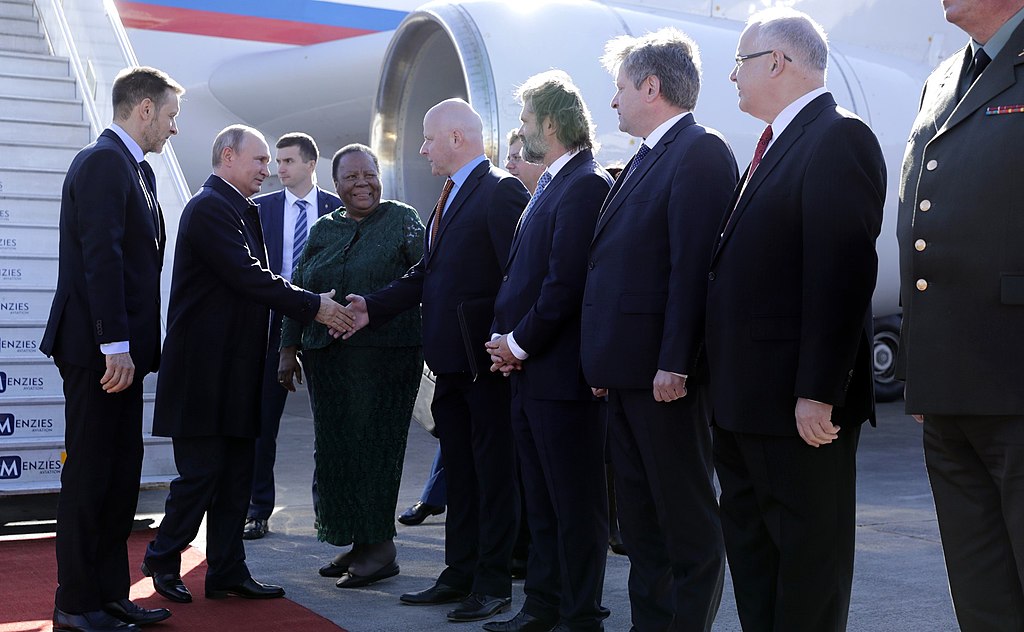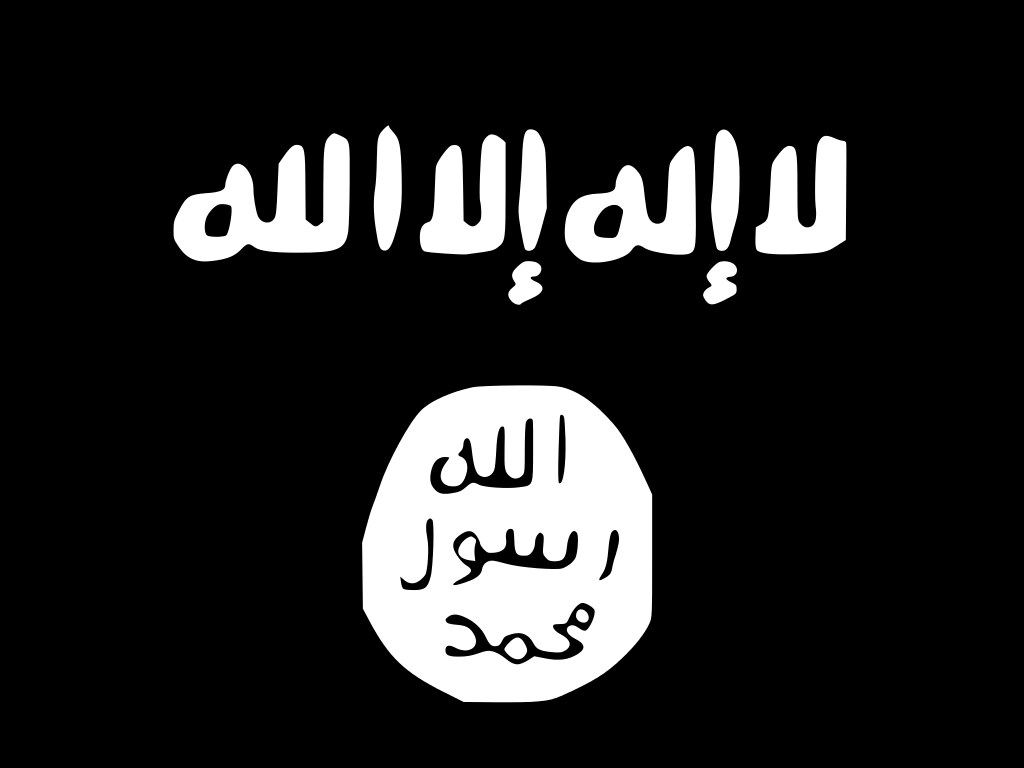
Vladimir Putin arrives in South Africa for the 10th BRICS Summit in 2018.
“The timing, if not the mission of Mbatha’s visit, seems likely to blow another hole in Pretoria’s claim to be non-aligned in the stand-off between Russia and the West over Russia’s invasion of Ukraine.”
Calling into question its self-proclaimed non-aligned status in the Russia-Ukraine war, South Africa’s army chief recently took a trip to Russia to discuss arms trade, following a diplomatic row with the U.S. Ambassador to South Africa. According to the Johannesburg-based The Daily Maverick, the head of the South African army, Lieutenant General Lawrence Mbatha, traveled to Russia in mid-May to discuss “issues relating to military cooperation and interaction aimed at the implementation of projects aimed at improving the combat readiness of the armed forces of both countries.” The visit is being read by many, including the author of the accompanying article, as coming in response to recent accusations by the U.S. Ambassador to South Africa that South Africa had loaded weapons and ammunition onto the Russian ship Lady R, when it docked in the country in December 2022. South Africa has denied the allegations. However, further reporting shows that South Africa’s National Conventional Arms Control Committee , the overseeing authority for such transfers, had indeed approved exports from South Africa to Russia prior to the start of the Russia-Ukraine war, some of which may have been delivered many years late. For its part, the South African National Defense Forces emphasized that Lt. Gen. Mbatha’s visit to Moscow had previously been scheduled before the U.S. Ambassador’s accusations. The opposition Democratic Alliance party has described the visit undertaken by members of the ruling African National Congress party to Russia as “shameful” and decried that “this unsolicited visit is the latest incident in a string where the South African government clearly and unashamedly demonstrates its support for Russia.” Long a reliable partner of the United States, South Africa has been taking the approach of many African states to the war in Ukraine.[i] It officially has a policy of non-alignment, which in practical terms, means active engagement with both Russia, on the one hand, and Ukraine and its NATO allies on the other. For its part, Russia is waging an all-out charm offensive in much of Africa, [ii] which is broadly proving to be successful.[iii] Just how sustainable this sort of status quo is for any of the parties—South Africa, the United States, or Russia—remains to be seen.
Source:
“SA army chief visits Moscow for talks about military cooperation,” The Daily Maverick (centrist newspaper from Johannesburg, South Africa), 15 May 2023. https://www.dailymaverick.co.za/article/2023-05-15-sa-army-chief-visits-moscow-for-talks-about-military-cooperation/
Lieutenant-General Lawrence Mbatha is meeting, among others, his Russian counterpart Colonel-General Oleg Salyukov. The timing, if not the mission of Mbatha’s visit, seems likely to blow another hole in Pretoria’s claim to be non-aligned in the stand-off between Russia and the West over Russia’s invasion of Ukraine.
The two military chiefs discussed “issues relating to military cooperation and interaction aimed at the implementation of projects aimed at improving the combat readiness of the armed forces of both countries,” TASS quoted Russia’s Defence Ministry as saying.
The Russians appeared to be maximising the strategic character of the visit, possibly to embarrass the US and the West. The SANDF, by contrast, tried to play down the significance – and the timing – of what it called a “goodwill” visit, saying it was a “long standing arrangement… planned well in advance.”
It said Mbatha would visit the “higher combined Army Academy and the Artillery Military Academy” and would have staff talks with military officials. “It must be noted that South Africa has Military to Military bilateral relations with various countries in the continent and beyond,” the SANDF said….
The visit comes just days after a major diplomatic row erupted between South Africa and the US when US ambassador to SA, Reuben Brigety, told journalists he was confident South Africa had loaded weapons and ammunition bound for Russia on to a US-sanctioned Russian cargo ship, the Lady R, in Simon’s Town naval base in December 2022….
DA defence spokesperson Kobus Marais said Mbatha’s mission to Moscow “once again demonstrates the ANC government’s callousness and insensitivity to our diplomatic and trade dilemma. This unsolicited visit is the latest incident in a string where the South African government clearly and unashamedly demonstrates its support for Russia.
“Even after the collapse of the rand and the call from the United States to honour relationships they still went ahead and conducted this visit. It is shameful,” he said in a statement….
The government has insisted that it did not authorise any arms sales to Russia, meaning that the National Conventional Arms Control Committee (NCACC) had not approved any exports. This appeared to leave open the possibility that arms might have been loaded on to the Lady R in a rogue operation.
However, the records of the NCACC do in fact indicate that some exports of arms to Russia have been approved by the NCACC.
Replying to questions in Parliament from DA leader John Steenhuisen in November last year, Mondli Gungubele, the minister in the presidency who also chairs the NCACC said:“The National Conventional Arms Control Committee has not received any request from any South African arms manufacturers for permission to export to the Russian Federation and/or Belarus arms, munitions, propellants and/or technology that may be used in the manufacture of the specified products since 24 February 2022.”
Notes:
[i] For more on African diplomatic approaches to the Russia-Ukraine conflict, see: Jason Warner, “African Stances on the Russia-Ukraine War Demonstrate Reliance on, Antipathy Toward West,” OE Watch, 09-2022. https://community.apan.org/wg/tradoc-g2/fmso/m/oe-watch-articles-2-singular-format/425767
[ii] For more on Russia’s long-term attempts to garner African allies, see: Jason Warner, “Russia Laying Groundwork Ahead of July 2023 Russia-Africa Summit,” OE Watch, 01-2023. https://community.apan.org/wg/tradoc-g2/fmso/m/oe-watch-articles-2-singular-format/434265
[iii] For more on Russian and the Wagner Group’s successful attempts to garner African allies, see: Jason Warner, “Top Ugandan General Adds to List of Growing Pro-Russian African Military Personnel” OE Watch,05-2023; Jason Warner, “Mali Defends Reliance on Russian Counterterrorism Assistance,” OE Watch, 03-2023. https://community.apan.org/wg/tradoc-g2/fmso/m/oe-watch-articles-2-singular-format/437332; Jason Warner, “Burkina Faso Fights Terrorism With Recruits and Russia,” OE Watch, 02-2023. https://community.apan.org/wg/tradoc-g2/fmso/m/oe-watch-articles-2-singular-format/436264; Jason Warner, “Russia-Supported Military Leaders in Mali, Burkina, and Guinea Continue To Deepen Ties,” OE Watch, 04-2023. https://fmso.tradoc.army.mil/2023/russia-supported-military-rulers-in-mali-burkina-faso-and-guinea-continue-to-deepen-ties/
Image Information:
Image: Vladimir Putin arrives in South Africa for the 10th BRICS Summit in 2018.
Source: https://commons.wikimedia.org/wiki/File:Vladimir_Putin_arrived_in_South_Africa_(2).jpg
Attribution: BY-SA 4.0

